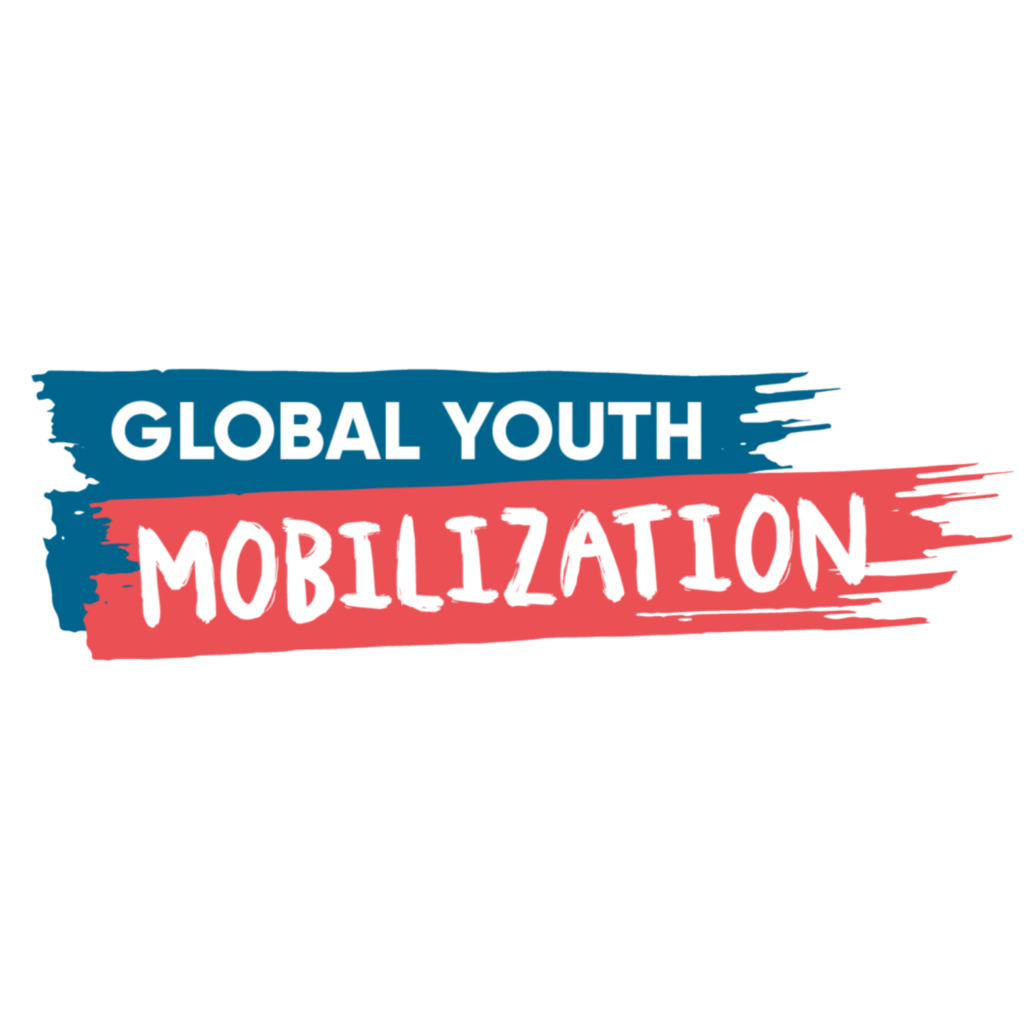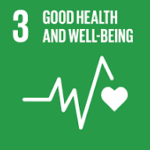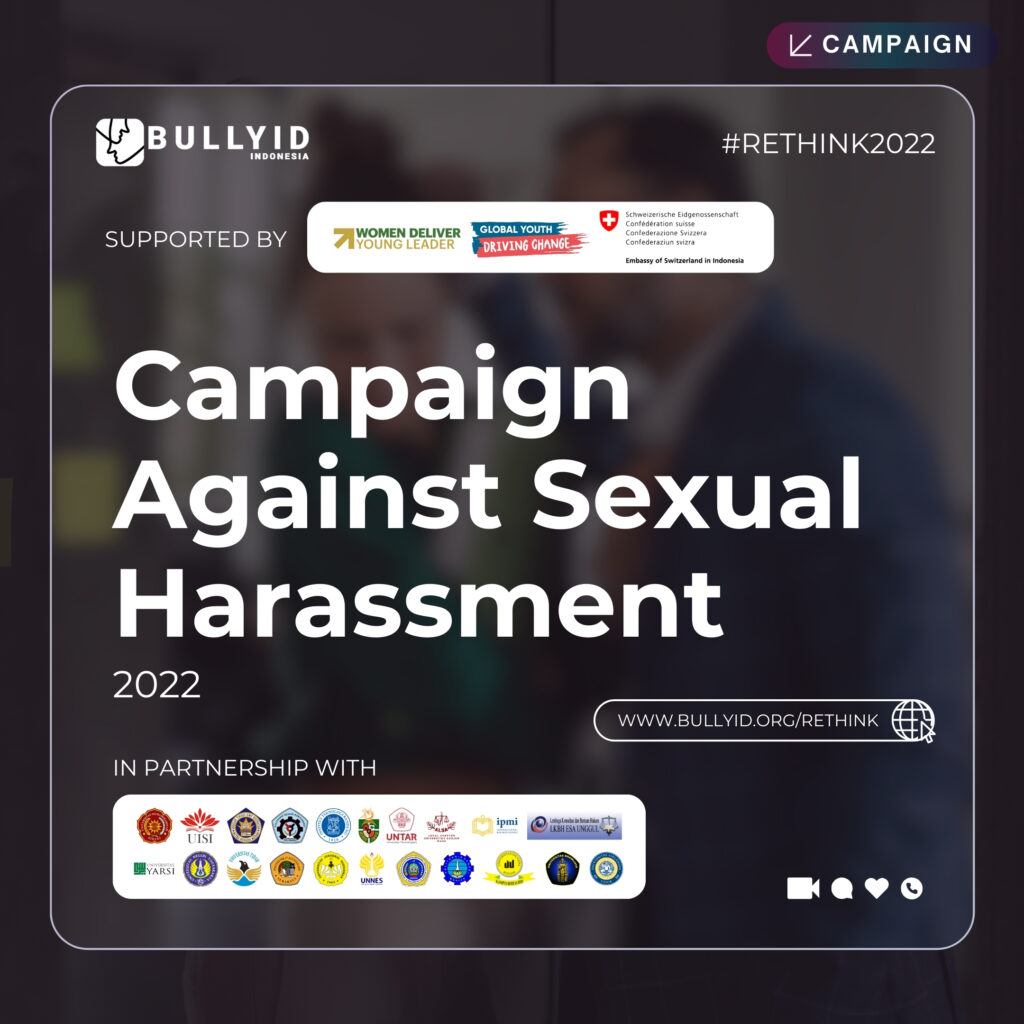
Campaign Against Sexual Harassment (CASH/RETHINK)
The latest data from the National Commission on Violence Against Women show that cases of sexual violence are most prevalent in higher education institutions. The higher the level of education, the higher the number of perpetrators and victims. In the past three years, cases of sexual violence at the high school level have stagnated in the 200s. Minister published the 2021 Ministerial Decree about the Prevention and Treatment of Sexual Violence in Higher Education, which became effective on Aug 30. Minister Nadim said the decree was urgent to protect students from becoming victims of sexual violence on campuses, often ignored or suppressed after their traumatic experiences.
Sexual assault is a significant health issue among female college students. Sexual assault survivors are more likely to report psychological disorders such as major Depressive Disorder and Post Traumatic Stress Disorder and drop out of school than students who had never been victims of sexual assault. For these reasons, as well as for others, universities need to reevaluate their sexual assault and misconduct policies to ensure the safety and health of female students, enable confidential & anonymous reporting platforms, to ensure proper learning environments for all students.
We also found that 45% of female students did not report the incident because the reports would be handled by their Universities, and they thought it would help. We see there is a lack of confidence in the current effectiveness of reporting mechanisms. Victims may believe their report will not be taken seriously, and it is unlikely that the offender (especially if the offenders are one of the lecturers) will be found or charged.
Project Objectives
CASH (Campaign Against Sexual Harassment) visions that students have the right to live and study in an environment free from all forms of sexual harassment and violence. They must be supported and empowered and should have trust in their institution to uphold their rights.
The CASH campaign aims to raise awareness of the prevalence of gender-based harassment and violence in higher education and seeks to engage both students and lecturers to combat all forms of harassment and violence against women students. We will work to ensure there is a coherent framework driving clear reporting and disclosure mechanisms, resourcing strong support services and ensuring long-term, sustainable interventions.
Victims/survivors who feel disrespected, afraid and silence will be listened to, feel respected, empowered and supported by having access to speak anytime with people they can rely on with any judgement.
People are uncertain about what is right and wrong and the behaviour expected of them are informed, and able to take action on sexual harassment.
Increase public awareness on the legal and mental health of sexual violence act towards victims and survivors.
Solving the issues of lack of mental health care available in the country and the expensive cost of legal fees by providing free mental health and legal support.
Main Activities
We convene training on sexual violence prevention and management for university students at 21 Universities and 3 student communities across Indonesia, 259 participants joined, and 100+ of the participants passed the test to become peer counsellors and paralegals on their campus.
- The domicile of participants: North Sumatra, East Java, West Java and DKI Jakarta, Central Java, South Sulawesi, Riau.
- The age range of the participants was 17-23 years, with the majority being 19 and 20 years.
- Most participants were women (94% women and 6% men)
In this training:
- We prepared a pre-test and post-test to determine the participants’ basic knowledge about the issues to be discussed in this training (sexual violence in campus environment).
- From the pre-test and post-test answers, it can be concluded that the majority of capacity-building participants for the prevention and handling of cases of sexual violence that occurred on campus during the training with University BEM were not PPKS task forces on their campuses or those who had not become task forces at their university. Therefore they do not yet have an understanding of gender-based violence. However, after participating PPKS training from BULLYID, the participants already understood the root causes of sexual violence, which lead to power relations and gender injustice caused by patriarchal culture.
We also create a toolkit and additional knowledge to provide ambassadors with an intensive skill set. The CASH Toolkit is designed for the public, young people, teachers, parents and survivors to get thorough information regarding online gender-based violence in Indonesia and better understand online safety. The Toolkit was promoted at the beginning of webinars through BULLYID’s social media,community and partners.
The Toolkit shares learning generated through the Ending Sexual Harassment and Violence in Higher Education; it offers a range of resources, covering areas such as policy development, training, and campaigning. The Toolkit is designed to be adapted to the needs of individuals, institutes, and local or national contexts. The toolkits are both for students and staff/teachers to use.
The Toolkit is filled with how-to’s and practical knowledge; it is a meaningful resource for parents and teachers to act as a central place for everyone’s cyber safety needs and questions. The Toolkit acts as a digital companion to guide survivors in understanding different types of Online-Gender Based Violence, the laws in Indonesia, what is considered digital evidence, how to write a chronology, how to report online, case resolution options and support system available for survivors/victims.

OGBV is a technology-facilitated form of GBV in which the act of violence is intended to harass the victim based on their gender or sexuality. The Association for Progressive Communications, citing a definition from the Internet Governance Forum, defines OGBV as a number of behaviors that are often considered a continuation of existing gender-based violence, such as domestic violence, stalking, sexual harassment, or targeting victims based on their gender or sexuality, carried out by using information and communication technology (ICT) facilities, such as mobile phones, the internet, and social media platforms.
- Online Surveillance/ Cyber Stalking/ Stalking and Monitoring (Penguntitan)
- Cyber harassment/ Harrassment/ Networked harassment
- Image-Based Sexual Abuse/ non-consensual distribution of intimate images/ Non-consensual pornography (or ‘revenge porn’)/Sexting/Sextortion
- Voyeurism/Creepshots
- Synthetic Media/ Morphing
- Public Disclosure of Private Information/ Doxing
- Defamation and Misrepresentation
- Impersonating/meniru identitas orang
- Hate speech
- Hacking
We implemented 4 webinars about practical strategies to prevent and respond to online gender-based violence, specifically focused on Non-Consensual Intimate Image Abuse (NCII). We also covered prevention and response efforts to sexual harassment cases in the university. Several topics discussed in the webinars:
- How Online Platforms Protect Their Users and What Are The Challenges?
- What to Do When We Face Cross-Border Jurisdiction?
- Privacy and Cybersecurity for Image-Based Abuse Survivors
- University Effort of Tackling Sexual Harassment in Indonesia & Switzerland
337 registrants have registered for the webinar in total, and each webinar is attended by a range of 93 – 211 participants, with details as follows:
- Age range: 18 – 57 years old female, 0.6% non-binary
- Gender: 73% male, 26.4% female, 0.6% non-binary
- Province of Origin: Java, Sumatra, Kalimantan, Sulawesi, Papua (most coming from Riau and North Sumatra province)
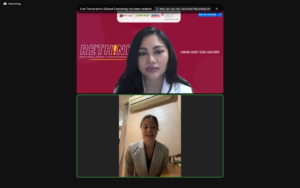
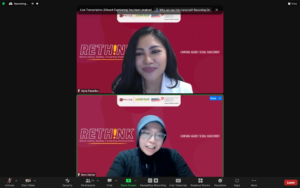
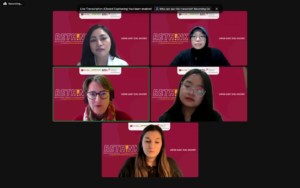
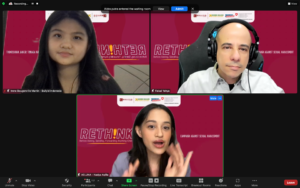
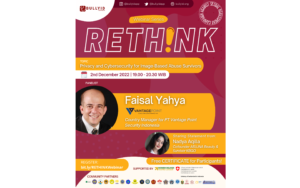
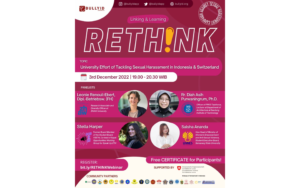
Social media campaigns
We launched a social media campaign to raise public awareness about types of gender-based violence (GBV), its psychological impact, and laws which protect victims at the national level. The posts also discuss the webinar topics, to give real-life case samples of the topic discussed, so the audience can get a preview of them before the webinar. We also partner with several grassroots communities to do the campaign.
- Our Campaign Background: A Survey conducted by Bullyid Indonesia on Revenge Porn
- Case Study: sextortion indicators, psychological and legal aspects of sextortion
- Case study about Data Privacy Breach for GBV (in collaboration with Jakarta Legal Aid for Women and Children)
- Law in Indonesia on NCII (in collaboration with our partner, Institute Criminal Justice Reform)
- Facts and How to Protect Ourselves from NCII (in collaboration with our partner, Tabu.id)
The growing number of shares and saves implies that the social media campaign has increased the audience’s awareness of GBV, particularly OGBV. Youths and young adults, who are mainly our audience, share this information with their friends and keep the posts as a reminder to themselves.
The campaign has also encouraged victims to be braver in speaking up and reporting since the national law protects victims’ rights. There are also various services like BULLYID and our partners who can support the legal and psychological aspects of the cases. Audiences are very interactive on Instagram Live, especially for the Live about “GBV and Stigmatization on AIDS Patients”. The speaker raises many questions regarding AIDS and sexual and reproductive health and rights, which means there is increased awareness on the topic.
- 55,188 instagram accounts reached through the campaign.
Series of Instagram Live with various NGO Partners
We also held a series of instagram live with various NGO partners.
- Instagram LIVE on Mental Health and GBV Services in Indonesia (with AngsaMerahClinic and Halojiwa Indonesia)
- Instagram Live on Stigmatization and GBV towards AIDS Patients (with Indonesia AIDS Coalition)
- Instagram Live on What Can Youths Do to Prevent NCII (with Y20 Indonesia Organizing Committee)
Instagram Story Challenge, in Collaboration with Aeluna Beauty
We additionally conducted a story challenge called “#BagiCeritamu (#ShareYourStory)” with our partner, a makeup enterprise named Aeluna Beauty, where webinar attendees shared insights they gained after joining either 1 of the 4 webinars to raise public awareness on gender-based violence. The top 3 winners got a makeup bundle as a gift.




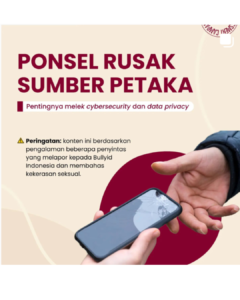
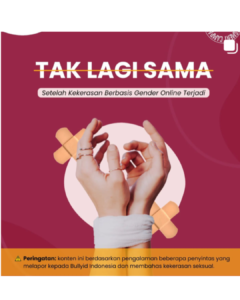
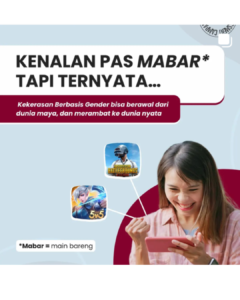
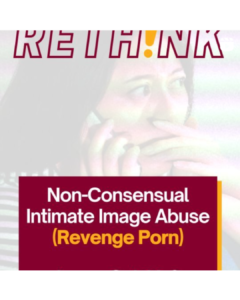
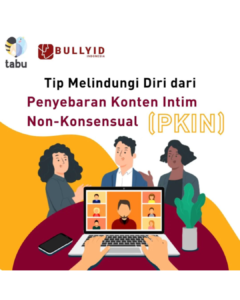
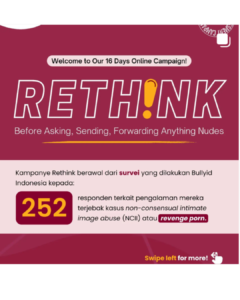
Project in Numbers
259 Young People/Ambassadors Trained
24 Students-led/Youth Organizations Across Indonesia
52,800 Additional Values of Beneficiaries and Impact
Project Timeline
- Non-Consensual Intimate Content (NCII) Dissemination Survey
- Developing #CASH agenda, objectives, toolkits and modules
- #CASH training registration for university student and BEM members
- Participants data collection
- Launch #CASH training
- Distribution of #CASH Modules and Toolkits
- Evaluate training results
- Engaging #CASH ambassadors for awareness campaign
- Starting webinars and #CASH social media campaign
- Participating in 16 days against domestic violence
- Launch Awareness Campaign with Youth Ambassadors
- Publishing a strategic recommendation for the GBV and OGBV issue
Relevant Laws & Regulations
- National Law No. 12 Year 2022 about Sexual Violence Crime Law (UU TPKS)
- 2021 Ministerial Decree about the Prevention and Treatment of Sexual Violence in Higher Education
- Law No. 11 of 2008 on Electronic information and transactions (UU ITE)
- The project works on SDGs number 3 (Good Health and Wellbeing), number 5 (Gender Equality), and 16 (Peace, Justice and Strong Institutions). The objective of CASH Project is to prevail social justice on all the platforms be it online or real-life and help all the people to come out of their mental health issues.
Youth Ambassadors
#CASH Ambassadors are representatives of Student Association Members from various Universities. We aim to provide modules and train at least 100 BEM representatives from 15 universities with equal representation from tier 2 and tier 3 cities across Indonesia.
Partnership


